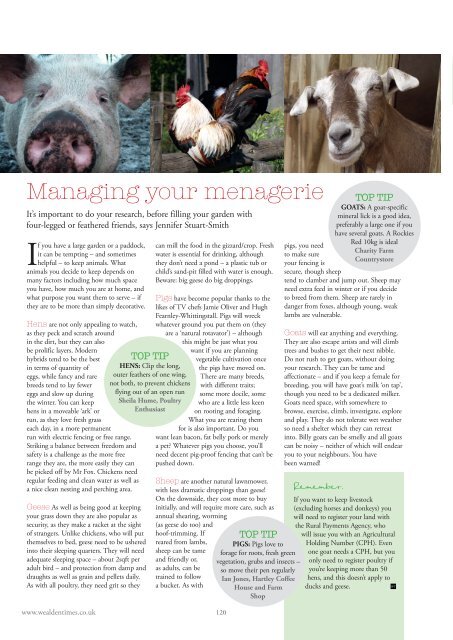Surrey Homes | SH18 | April 2016 | Garden supplement inside
The lifestyle magazine for Surrey - Inspiring Interiors, Fabulous Fashion, Delicious Dishes
The lifestyle magazine for Surrey - Inspiring Interiors, Fabulous Fashion, Delicious Dishes
Create successful ePaper yourself
Turn your PDF publications into a flip-book with our unique Google optimized e-Paper software.
Managing your menagerie<br />
It’s important to do your research, before filling your garden with<br />
four-legged or feathered friends, says Jennifer Stuart-Smith<br />
If you have a large garden or a paddock,<br />
it can be tempting – and sometimes<br />
helpful – to keep animals. What<br />
animals you decide to keep depends on<br />
many factors including how much space<br />
you have, how much you are at home, and<br />
what purpose you want them to serve – if<br />
they are to be more than simply decorative.<br />
Hens are not only appealing to watch,<br />
as they peck and scratch around<br />
in the dirt, but they can also<br />
be prolific layers. Modern<br />
hybrids tend to be the best<br />
in terms of quantity of<br />
eggs, while fancy and rare<br />
breeds tend to lay fewer<br />
eggs and slow up during<br />
the winter. You can keep<br />
hens in a moveable ‘ark’ or<br />
run, as they love fresh grass<br />
each day, in a more permanent<br />
run with electric fencing or free range.<br />
Striking a balance between freedom and<br />
safety is a challenge as the more free<br />
range they are, the more easily they can<br />
be picked off by Mr Fox. Chickens need<br />
regular feeding and clean water as well as<br />
a nice clean nesting and perching area.<br />
Geese As well as being good at keeping<br />
your grass down they are also popular as<br />
security, as they make a racket at the sight<br />
of strangers. Unlike chickens, who will put<br />
themselves to bed, geese need to be ushered<br />
into their sleeping quarters. They will need<br />
adequate sleeping space – about 2sqft per<br />
adult bird – and protection from damp and<br />
draughts as well as grain and pellets daily.<br />
As with all poultry, they need grit so they<br />
TOP TIP<br />
HENS: Clip the long,<br />
outer feathers of one wing,<br />
not both, to prevent chickens<br />
flying out of an open run<br />
Sheila Hume, poultry<br />
Enthusiast<br />
can mill the food in the gizzard/crop. Fresh<br />
water is essential for drinking, although<br />
they don’t need a pond – a plastic tub or<br />
child’s sand-pit filled with water is enough.<br />
Beware: big geese do big droppings.<br />
Pigs have become popular thanks to the<br />
likes of TV chefs Jamie Oliver and Hugh<br />
Fearnley-Whittingstall. Pigs will wreck<br />
whatever ground you put them on (they<br />
are a ‘natural rotavator’) – although<br />
this might be just what you<br />
want if you are planning<br />
vegetable cultivation once<br />
the pigs have moved on.<br />
There are many breeds,<br />
with different traits;<br />
some more docile, some<br />
who are a little less keen<br />
on rooting and foraging.<br />
What you are rearing them<br />
for is also important. Do you<br />
want lean bacon, fat belly pork or merely<br />
a pet? Whatever pigs you choose, you’ll<br />
need decent pig-proof fencing that can’t be<br />
pushed down.<br />
Sheep are another natural lawnmower,<br />
with less dramatic droppings than geese!<br />
On the downside, they cost more to buy<br />
initially, and will require more care, such as<br />
annual shearing, worming<br />
(as geese do too) and<br />
hoof-trimming. If<br />
reared from lambs,<br />
sheep can be tame<br />
and friendly or,<br />
as adults, can be<br />
trained to follow<br />
a bucket. As with<br />
TOP TIP<br />
pIGS: Pigs love to<br />
forage for roots, fresh green<br />
vegetation, grubs and insects –<br />
so move their pen regularly<br />
Ian Jones, Hartley Coffee<br />
House and Farm<br />
Shop<br />
pigs, you need<br />
to make sure<br />
your fencing is<br />
secure, though sheep<br />
Remember.<br />
TOP TIP<br />
GOATS: A goat-specific<br />
mineral lick is a good idea,<br />
preferably a large one if you<br />
have several goats. A Rockies<br />
Red 10kg is ideal<br />
Charity Farm<br />
Countrystore<br />
tend to clamber and jump out. Sheep may<br />
need extra feed in winter or if you decide<br />
to breed from them. Sheep are rarely in<br />
danger from foxes, although young, weak<br />
lambs are vulnerable.<br />
Goats will eat anything and everything.<br />
They are also escape artists and will climb<br />
trees and bushes to get their next nibble.<br />
Do not rush to get goats, without doing<br />
your research. They can be tame and<br />
affectionate – and if you keep a female for<br />
breeding, you will have goat’s milk ‘on tap’,<br />
though you need to be a dedicated milker.<br />
Goats need space, with somewhere to<br />
browse, exercise, climb, investigate, explore<br />
and play. They do not tolerate wet weather<br />
so need a shelter which they can retreat<br />
into. Billy goats can be smelly and all goats<br />
can be noisy – neither of which will endear<br />
you to your neighbours. You have<br />
been warned!<br />
If you want to keep livestock<br />
(excluding horses and donkeys) you<br />
will need to register your land with<br />
the Rural Payments Agency, who<br />
will issue you with an Agricultural<br />
Holding Number (CPH). Even<br />
one goat needs a CPH, but you<br />
only need to register poultry if<br />
you’re keeping more than 50<br />
hens, and this doesn’t apply to<br />
ducks and geese.<br />
www.wealdentimes.co.uk<br />
120


















